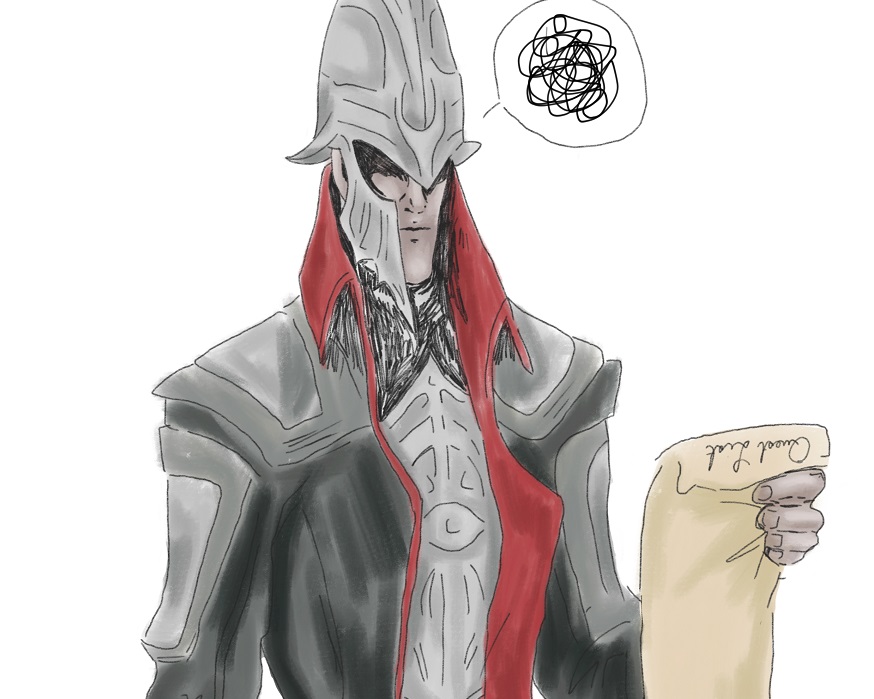Video-Games and Content Overload
Even as many modern video-game single-player campaigns get shorter, with titles like Call of Duty clocking in at six hours or less, some games and entire genres remain set on jamming in as many hours of playtime as possible. Although having a million hours of gameplay sounds great on the box, and it sounds like a great value for your $60, this isn’t always the case. There is no better recent game to use as an example of this than last year’s Bioware RPG Dragon Age: Inquisition.
In an interview with Polygon, Bioware producer Cameron Lee boasted about the game requiring between 150 and 200 hours to completely finish. It turned out that he wasn’t exaggerating. While on their epic 200 hour journey in Inquisition, players engage in such thrilling tasks as planting flags in the ground, collecting largely meaningless magic shards and pieces of paintings, carrying out endless step and fetch quests for paper-thin characters, and clearing out copy-and-paste groups of generic enemies. That’s all about as interesting as it sounds.
However, this problem is hardly exclusive to Inquisition, since it was cut from the same cloth as open-world games such as Grand Theft Auto, the Elder Scrolls series, Assassin’s Creed, etc. They share a crippling tendency to suffer from content overload and a severe lack of focus. For example, Assassin’s Creed has gotten bigger with every release. There’s more mini-games, side-quests, collectibles, shops, and random things to do than ever before. All this did though was make the in-game maps hilariously crowded and emphasize how little care was put into each individual piece of content. The assassination contracts you can accept on the side feel like they were whipped up by an intern on his lunch break, but there sure are a lot of them!
The obvious counterargument is to point out that content like this is ultimately optional. You can usually bang out main story missions in games like Inquisition and Assassin’s Creed in a fraction of the amount of time it would take you to do everything. The problem is that the kitchen sink approach to adding content drags the overall quality down. The time that they could have spent lengthening the main story, creating emotionally involving and interesting side-quests, and hammering out gameplay flaws gets spent instead on jamming in as much filler as humanly possible.
Finally, the longer a game is, the stronger its core gameplay has to be. Inquisition’s combat mechanics revolve around holding down the right trigger, tapping the face buttons, and watching the fireworks. The eternally recycled Assassin’s Creed combat feels like a distinctly more terrible version of the Batman Arkham series’ combat system if counters beat everything. These games works for a time, but their mechanics can’t sustain being dragged out over dozens of extra hours until their flaws become glaringly apparent.
This leaves the question of how to balance content and quality. To give an example, Far Cry 3 is an open-world game, but it never overstays its welcome over its 10-20 hour playtime. You could strip out the open world aspect of Far Cry 3 and you would still have a pretty damn good linear action game; the extra things to do on the side are just the icing on the cake. There’s room to explore and a good variety of things to do on the side, but they showed restraint and didn’t board the endless filler train that so many other games do. Optional activities are often connected to nifty gear and skill upgrades, so you have a tangible incentive to do them beyond the compulsion of doing things for the sake of doing them.
If there’s something to do when you are not doing a game’s main story, you should do it because it’s fun. The model where you give the player as many boxes to tick as possible without a care in the world for what they’re actually doing certainly inflates the gameplay time, but it never improves the game. To go back in time for a moment to illustrate this, there was a side-quest in the old Bioware game Star Wars: Knights of the Old Republic that revolved around locating a droid that a widower has developed an unhealthy attachment to. It’s a short, yet effective slice of conversations, combat, and exploration, and it all caps off with one of Bioware’s first genuinely difficult choices. And that’s better than ten step and fetch quests combined.







